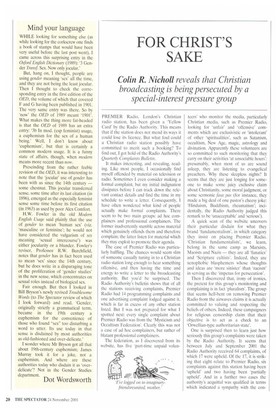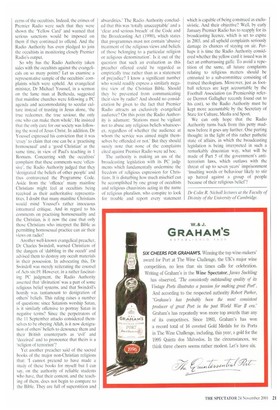FOR CHRIST'S SAKE
Colin R. Nicho11 reveals that Christian
broadcasting is being persecuted by a special-interest pressure group
PREMIER Radio, London's Christian radio station, has been given a 'Yellow Card' by the Radio Authority. This means that if the station does not mend its ways it could lose its licence. But what foul could a Christian radio station possibly have committed to merit such a booking? To find out, I got hold of the Radio Authority's Quarterly Complaints Bulletin.
It makes interesting, and revealing, reading. Like most people. I occasionally find myself offended by material on television or radio. Sometimes I even consider making a formal complaint, but my initial indignation dissipates before I can track down the relevant contact details and find the time in my schedule to write a letter. Consequently, I have often wondered what kind of people actually make formal complaints. There seem to be two main groups: ad hoc complainers and professional complainers. The former inadvertently stumble across material which genuinely offends them and therefore complain; the latter listen for material which they may exploit to promote their agenda.
The case of Premier Radio was particularly baffling. The chances would seem slim of someone casually tuning in to a Christian radio station long enough to hear something offensive, and then having the time and energy to write a letter to the broadcasting authority. But you'd be surprised. The Radio Authority's bulletin shows that of all the stations receiving complaints, Premier Radio had 14 programming complaints and one advertising complaint lodged against it, which is far in excess of any other station listed. But I was not prepared for what I spotted next: every single complaint about Premier Radio was from the 'Mysticism and Occultism Federation'. Clearly this was not a case of ad hoc complainers, but rather of blatant professional complainers.
The federation, as I discovered from its website, has five 'part-time unpaid volun teers' who monitor the media, particularly Christian media, such as Premier Radio, looking for 'unfair' and 'offensive' comments which are exclusivistic or 'intolerant' of other `spiritualities', such as Satanism, occultism, New Age, magic, astrology and divination. Apparently these volunteers are so committed to such monitoring that they carry on their activities 'at unsociable hours': presumably, when most of us are sound asleep, they are listening to evangelical preachers. Why these sleepless nights? It seems that they are just longing for someone to make some juicy exclusive claim about Christianity, some moral judgment, or some sermonic faux pas (for instance, they made a big deal of one pastor's cheesy joke: 'Hinduism, Buddhism, rheumatism'; incidentally, the Radio Authority judged this remark to be 'unacceptable' and `serious').
A quick scan of the website uncovers their particular disdain for what they brand 'fundamentalism', in which category they insist on placing Premier Radio. 'Christian fundamentalists', we learn, belong in the same camp as Marxists, Maoists and Nazis — they are all 'fanatics' and 'Scripture cultists'. Indeed, they are xenophobic blasphemers whose thoughts and ideas are 'more sinister' than 'racism' in serving as the 'impetus for persecution'.
Then I discovered that, irony of ironies, the pretext for this group's monitoring and complaining is in fact 'pluralism'. The group that seems hell-bent on removing Premier Radio from the airwaves claims it is actually committed to valuing and respecting the beliefs of others. Indeed, these campaigners for religious censorship claim that their objective is to act as a check to an 'Orwellian-type authoritarian state'.
One is surprised then to learn just how seriously this group's complaints were taken by the Radio Authority. It seems that between July and September 2001 the Radio Authority received 64 complaints, of which 17 were upheld. Of the 17, it is striking that eight relate to Premier Radio, six complaints against this station having been 'upheld' and two having been 'partially upheld'. And in a further two cases the authority's acquittal was qualified in terms which indicated a sympathy with the con cerns of the occultists. Indeed, the crimes of Premier Radio were such that they were shown the 'Yellow Card' and warned that serious sanctions would be imposed on them if they continued to offend. And the Radio Authority has even pledged to join the occultists in monitoring closely Premier Radio's output.
So why has the Radio Authority taken sides with the occultists against the evangelicals on so many points? Let us examine a representative sample of the occultists' complaints which were upheld. An evangelical minister, Dr Michael Youssef, in a sermon on the lame man at Bethesda, suggested that mainline churches were following a PC agenda and accommodating to secular culture instead of trusting in Jesus alone, 'the true redeemer, the true saviour, the only one who can make them whole'. He insisted that the only cure for our society was following the word of Jesus Christ. In addition, Dr Youssef expressed his conviction that it was 'crazy' to claim that one can be a 'practising homosexual' and a 'good Christian' at the same time, in view of Paul's teaching in 1 Romans. Concurring with the occultists' complaint that these comments were 'offensive', the Radio Authority judged that they 'denigrated the beliefs of other people' and thus contravened the Programme Code. Aside from the 'offence' many mainline Christians might feel at occultists being received as their authoritative representatives. I doubt that many mainline Christians would mind Youssef's rather innocuous intramural critique. And in regard to his comments on practising homosexuality and the Christian, is it now the case that only those Christians who interpret the Bible as permitting homosexual practice can air their views on radio?
Another well-known evangelical preacher, Dr Charles Swindoll, warned Christians of the dangers of 'dabbling in the occult' and advised them to destroy any occult materials in their possession. In advocating this, Dr Swindoll was merely reiterating the counsel of Acts xix:19. However. in a rather fascinating PC judgment, the Radio Authority asserted that 'divination' was a part of some religious belief systems, and that Swindoll's homily was tantamount to denigration of others' beliefs. This ruling raises a number of questions: since Satanists worship Satan, is it similarly offensive to portray Satan in negative terms? Since the perpetrators of the 11 September attacks considered themselves to be obeying Allah, is it now denigration of others' beliefs to denounce them and their British counterparts as 'evil' and 'deceived' and to pronounce that theirs is a 'religion of terrorism'?
Yet another preacher said of the sacred books of the major non-Christian religions that: 'I cannot pretend to have made a study of these books for myself but I can say, on the authority of reliable students who have, that their content, and the teaching of them, does not begin to compare to the Bible. They are full of superstition and absurdities.' The Radio Authority concluded that this was `totally unacceptable' and a 'clear and serious breach' of the Code and the Broadcasting Act (1990), which states that programmes must not contain 'abusive treatment of the religious views and beliefs of those belonging to a particular religion or religious denomination'. Is it out of the question that such an evaluation as this preacher offered could be regarded as empirically true rather than as a statement of prejudice? I know a significant number who would readily express a similarly negative view of the Christian Bible. Should they be prevented from communicating their view by radio? And should no consideration be given to the fact that Premier Radio attracts an exclusively evangelical audience? On this point the Radio Authority is adamant: 'Stations must be vigilant not to abuse any religious beliefs whatsoever, regardless of whether the audience at whom the service was aimed might themselves be offended or not.' But they should surely note that none of the complaints cited against Premier Radio were ad hoc.
The authority is making an ass of the broadcasting legislation with its PC judgments which fundamentally undermine the freedom of religious expression for Christians. It is disturbing how much mischief can be accomplished by one group of occultists and religious chauvinists acting in the name of religious pluralism, who conspire to look for trouble and report every statement which is capable of being construed as exclusivistic. And their objective? Well, by early January Premier Radio has to reapply for its broadcasting licence, which is set to expire in 2003, and all upheld complaints seriously damage its chances of staying on air. Perhaps it is time the Radio Authority considered whether the yellow card it issued was in fact an embarrassing gaffe. To avoid a repetition of the same, all future complaints relating to religious matters should be entrusted to a sub-committee consisting of trained theologians. Moreover, just as football referees are kept accountable by the Football Association (as Premiership referee Dermot Gallagher recently found out to his cost), so the Radio Authority must be kept more accountable by the Secretary of State for Culture, Media and Sport.
We can only hope that the Radio Authority turns back from this petty madness before it goes any further. One parting thought: in the light of this rather pathetic state of affairs, in which the broadcasting legislation is being interpreted in such a remarkably draconian way, what will be made of Part 5 of the government's antiterrorism laws, which outlaws with the threat of up to seven years' imprisonment 'insulting words or behaviour likely to stir up hatred against a group of people because of their religious belief'?
Dr Colin R. Nicholl lectures at the Faculty of Divinity of the University of Cambridge.



















































































 Previous page
Previous page